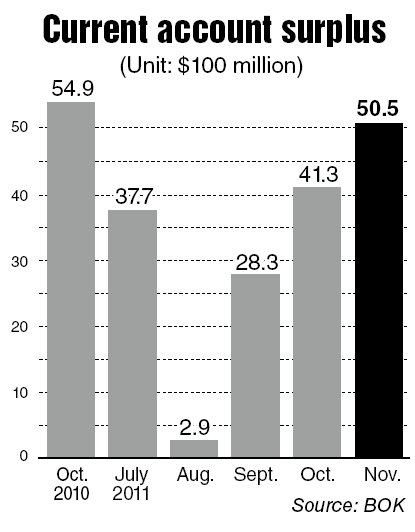Weakening imports suggest problems with domestic demand; export outlook remains gloomy
Korea’s current account surplus widened to $5.05 billion in November on the back of solid export growth, marking the highest monthly level in 13 months, data showed Thursday.
According to the Bank of Korea, the November figure marked the 21st straight month in which the current account, a key measure of cross-border trade, has been in the black.
The latest surplus numbers, up from a revised $4.13 billion in October, puts the combined surplus during the January-November period at $24.2 billion.

The central bank said that given the bigger-than-expected surplus in November, the country’s 2011 yearly surplus will exceed its target of $27.2 billion.
“Although exports of semiconductors and flat panels slowed, automotive and other export shipments went strong,” said Yang Jae-ryong, director of the BOK’s monetary and financial statistics division, at a press conference.
Yang said Korea is “likely to easily meet the central bank’s surplus target this year.”
The surplus in goods rose to $4.49 billion on the strength of petrochemical and automotive exports, up from $3.55 billion.
Exports went up 12.6 percent on-year to $47.1 billion and imports rose 10.4 percent to $42.6 billion. Compared with a month earlier, however, imports fell 0.69 percent, suggesting that domestic demand might lose further momentum.
“Imports continued to decline from September,” Yang said. “The capital goods sector was sluggish last month and consumer products weakened this month, which reflects the slowing consumer spending.”
The capital and financial account posted a net outflow of $6.63 billion last month, compared with an outflow of a revised $4.5 billion in October, affected by stock sales by foreign investors spooked by the eurozone debt debacle.
The 2012 outlook for exports, which account for about 50 percent of Asia’s fourth-largest economy, remains uncertain, partly due to the continued uncertainty generated by the eurozone crisis.
Analysts also predict the current account surplus will shrink next year, and the BOK’s projection is that the country’s 2012 current account surplus will stand at around $13 billion.
With the external risks and domestic issues such as household debt and inflation showing no sign of a breakthrough, Korea’s economic growth is forecast to slow down to 3.7 percent next year.
By Yang Sung-jin (insight@heraldcorp.com)
Korea’s current account surplus widened to $5.05 billion in November on the back of solid export growth, marking the highest monthly level in 13 months, data showed Thursday.
According to the Bank of Korea, the November figure marked the 21st straight month in which the current account, a key measure of cross-border trade, has been in the black.
The latest surplus numbers, up from a revised $4.13 billion in October, puts the combined surplus during the January-November period at $24.2 billion.

The central bank said that given the bigger-than-expected surplus in November, the country’s 2011 yearly surplus will exceed its target of $27.2 billion.
“Although exports of semiconductors and flat panels slowed, automotive and other export shipments went strong,” said Yang Jae-ryong, director of the BOK’s monetary and financial statistics division, at a press conference.
Yang said Korea is “likely to easily meet the central bank’s surplus target this year.”
The surplus in goods rose to $4.49 billion on the strength of petrochemical and automotive exports, up from $3.55 billion.
Exports went up 12.6 percent on-year to $47.1 billion and imports rose 10.4 percent to $42.6 billion. Compared with a month earlier, however, imports fell 0.69 percent, suggesting that domestic demand might lose further momentum.
“Imports continued to decline from September,” Yang said. “The capital goods sector was sluggish last month and consumer products weakened this month, which reflects the slowing consumer spending.”
The capital and financial account posted a net outflow of $6.63 billion last month, compared with an outflow of a revised $4.5 billion in October, affected by stock sales by foreign investors spooked by the eurozone debt debacle.
The 2012 outlook for exports, which account for about 50 percent of Asia’s fourth-largest economy, remains uncertain, partly due to the continued uncertainty generated by the eurozone crisis.
Analysts also predict the current account surplus will shrink next year, and the BOK’s projection is that the country’s 2012 current account surplus will stand at around $13 billion.
With the external risks and domestic issues such as household debt and inflation showing no sign of a breakthrough, Korea’s economic growth is forecast to slow down to 3.7 percent next year.
By Yang Sung-jin (insight@heraldcorp.com)
-
Articles by Korea Herald








![[KH Explains] No more 'Michael' at Kakao Games](http://res.heraldm.com/phpwas/restmb_idxmake.php?idx=644&simg=/content/image/2024/04/28/20240428050183_0.jpg&u=20240428180321)


![[Weekender] How DDP emerged as an icon of Seoul](http://res.heraldm.com/phpwas/restmb_idxmake.php?idx=644&simg=/content/image/2024/04/25/20240425050915_0.jpg&u=)







![[Herald Interview] Mistakes turn into blessings in street performance, director says](http://res.heraldm.com/phpwas/restmb_idxmake.php?idx=652&simg=/content/image/2024/04/28/20240428050150_0.jpg&u=20240428174656)
